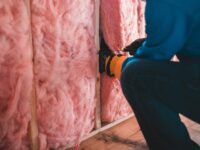The following contribution is from another author.
You may have come across the term HVAC when considering heating or cooling systems for your building. HVAC systems are gaining popularity, but what is this system? HVAC is short for Heating, Ventilation, and Air Conditioning. And as the name suggests, this system is responsible for cooling and heating various buildings.
The main reason for this system being famous is that it provides ventilation of fresh air and thus boosts the air quality indoors. Companies that offer hvac installation Denver way, or installation in other locations, supply offices, homes, gyms, and many other locations with ventilation systems. In addition to cooling and heating, it removes bacteria, dust, smoke, moisture, and other such allergens from the inside thus providing the optimum internal environment for your building. If you are new to the concept of HVAC systems, then you have come to the right place. This article will provide you an insight into the HVAC system.
What Is Included In the System?
The main components of the HVAC system are the elements that provide heating, ventilation, and air conditioning. In the heating part, the pipes and ductworks will provide heated air. The ventilation part allows fresh air to improve the air quality inside the buildings. This is most commonly used to remove stale air from the inside and bring in clean air. And lastly, the air conditioning part provides cool air and removes warm air from the inside to the outside.
You may be wondering if there is any difference between air conditioning and an HVAC system. Then this would have been cleared by the fact that air conditioning is one thing while HVAC is a complete system that provides multiple benefits. Moreover, air conditioning is one part of the HVAC system. You can find out more at servicefirstactx.com.
Types of HVAC systems
Before you get the heating-cooling system, it is important to know what type of HVAC system is best for your needs and living.
Single-stage system
This is an inexpensive system that provides only cooling or heating. It is best for people who live in cold or hot environments. A drawback of this system is that they are inefficient. In the advanced versions, you can adjust the speed of the fan to improve efficiency, but they are expensive in the long run.
Zoned systems
These systems provide cooling or heating in specific areas of the building. There are zone valves inside the vents that are used to block the airflow in a specific zone. This is efficient and effective for large buildings.
Duct-free split system
Just as the name suggests, this system does not function through ducts. This is a good choice for supplying buildings with duct-free heating. And this is also good for rooms where the ducts cannot be furnished easily.
Humidity control systems
HVAC systems also provide humidifiers as well as dehumidifiers. It is essential for dry, tropical areas.
Heating systems
There are different types of systems that provide heating:
- There are furnace-type systems that give heat via ducts work by burning substances. This uses propane or natural gas.
- Boilers, on the other hand, use oil or gas that heats the water and provides hot air.
- The hydronic heating system is another type that provides heat through tubes that are laid under the floor. This is an efficient way of heating the indoors.
How Does the System Work
Cooling and heating systems are an important part of the building, which when malfunction causes a big problem. As the name suggests the HVAC system works through three important functions. The following are the 9 important parts of an HVAC system that are involved in providing cooling or heating.
1. Thermostat
This part is where the cycle starts. The air is drawn in, which is then filtered and passed to the main components.
2. Filter
This is the part that filters the air that is drawn in. It is important to change filters on a regular basis. So that dust and dirt do not cause problems.
3. Blower
This is responsible for moving the warm air along the main component of the system. A durable system will efficiently blow the air through.
4. Ducts work
These are the passageways through which the cooled or heated air travels. This should be cleaned regularly for 2 to 5 years.
5. Electrical component
This is an important part that functions your HVAC system.
6. Outdoor components
This is located on the outside and consists of a fan that allows the flow of air. It should be kept clean to avoid unnecessary and dangerous things from being sucked in by the fan.
7. Compressor
This is a part of the outdoor component that converts the refrigerant to liquid form, which then travels to the coils.
8. Coils
The refrigerant and the coils will then cool the air that travels through. Coils should be checked for any freezes.
9. Exhaust vents
This part expels the air that is produced by the heating system.
How long will an HVAC System work for?
So if you understand the HVAC system, its types, and how does it function, then you must want to know the next thing. How long will this system work for? Well, it all depends on the type of system you have and the company you purchased it from. But with careful functioning and regular maintenance from heating repair Henderson, your HVAC system can last for quite some years.
The bottom Line
As you saw above, HVAC systems are rising in popularity due to their many great benefits. They allow you to enjoy a controlled and fresh indoor environment due to the ventilation of air. Installing an HVAC system is not a piece of cake and requires the work of a professional technician.
If you have become curious about this system, then it’s best you consider professionals for the job. HVAC systems are used for both residential and commercial purposes. They keep your building cool in the summers and warm in the winters, thus providing a pleasant internal environment throughout the year. We would highly recommend you to get your own HVAC system; it will surely not leave you disappointed. Don’t miss out! So get yours installed today!

















I really liked the part of your article that mentioned how zoned systems can be installed to be able to be effective for large buildings. With how large our new house is, I figured that getting just one cooling appliance for our house would be extremely wasteful and not very energy-efficient. With that in mind, I’ll look for an HVAC contractor in the area that can help us get a zoned cooling system right away so we’re ready for the summer season.